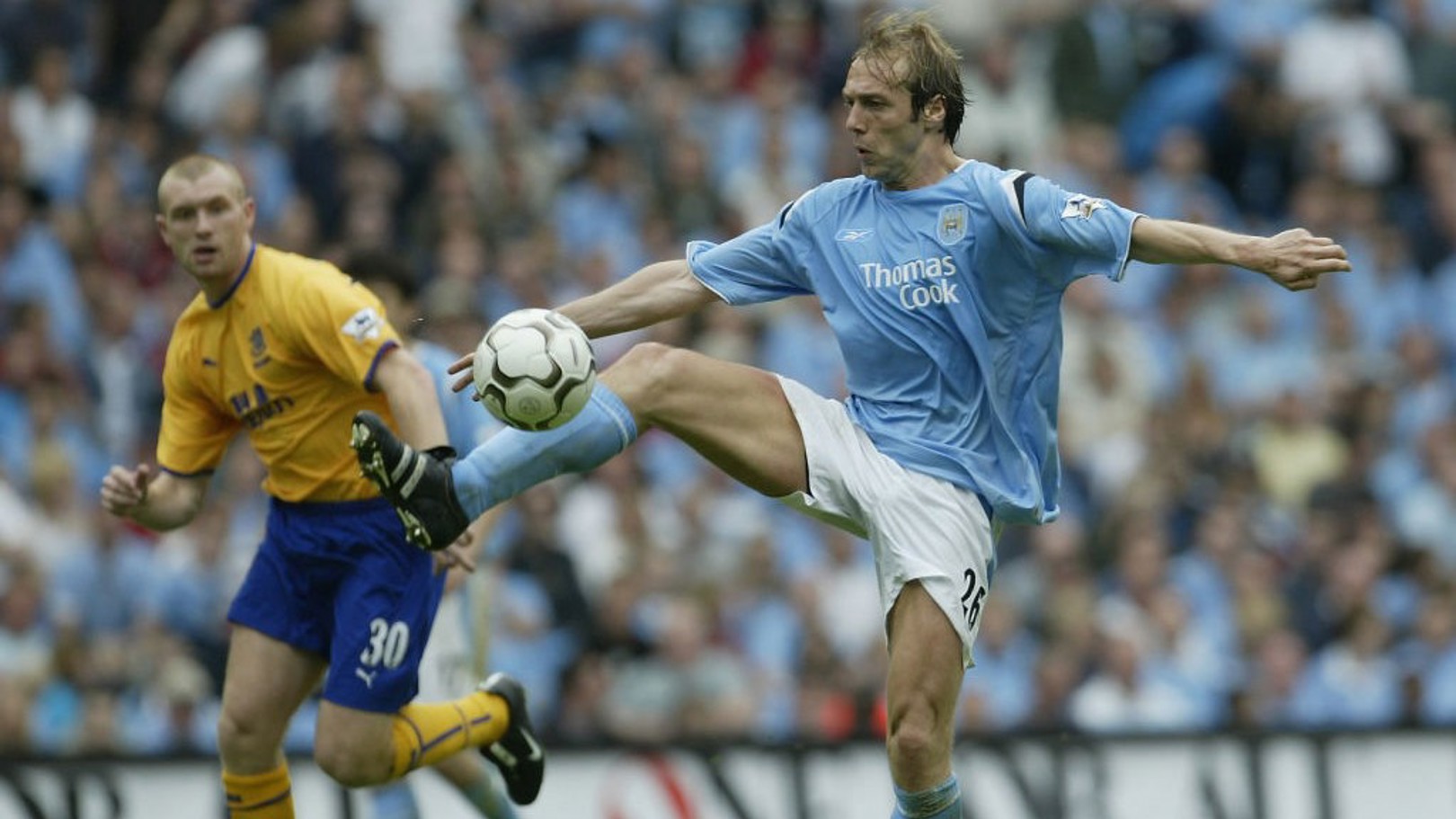The tough tackling Dutchman spent two seasons in Manchester between 2003 and 2005, turning out 65 times under Kevin Keegan and Stuart Pearce.
Since retiring in 2007 he has embarked on a coaching career, taking charge of the Netherlands U21s alongside a similar role at FC Twente before returning to Go Ahead Eagles, the club where he began his playing career.
CHECK OUT THE 2020/21 TRAINING RANGE
Bosvelt is the Dutch second division side’s Technical Manager, a diverse role which combines first team recruitment with running their fledgling youth operation.
Though a vastly different set-up to that of his former employers, the 50-year-old admits to casting an admiring eye at the City Football Academy, where the approach has influenced his own work back in Holland.
“I was a coach for about 10 years and sort of came into this role by luck,” he told mancity.com.
“I came in as an adviser. They had a few problems and they asked for support and it grew into the role of Technical Manager, which I’ve been doing for two years now.
“The club has its own DNA. It makes its own philosophy and the style of play.
“We’ve always produced a lot of talented players who went on to have big careers. We want to get back to that and give youth players a chance.
“That’s why we want to improve our youth academy. It is hard to compare our academy to City’s. They have kids from all over the world and we only take kids from our area.
“But the facility, the approach and how professionally they work with youth players is a good example for us.
“We have a different budget, but we pick out the good things that we can achieve and sort of copy them in our own way.”
That Bosvelt keeps one eye on City is as much for personal reasons as it is professional, and it is a measure of the impact the Club had on him that he refers to his last visit as a homecoming.
The midfielder might only have spent two seasons in Manchester, but for him it was a special return in November 2017, when he appeared at City Square before watching the current crop of stars beat Feyenoord 1-0 in the Champions League group stage.
“It felt like I was coming home, even though I only stayed for two seasons,” he said.
“I really enjoyed football in England and I really enjoyed Manchester as a city. As a Dutch guy, it was a very nice city.
“I stayed in the Midland Hotel for the first three and a half months. There was a lot to do and I took a lot of walks through the city. I liked the people and their mentality.
“After 15 years of playing in Holland it was a big adventure. I was 33 at that time and playing for the Dutch national team, but it was a big experience for me to go abroad. It was very exciting.
“I look back positively on that period.”
Enjoyable it may have been, but it was not without its challenges.
Whilst his efforts proved he didn’t come to England merely to wind down his career, Bosvelt arrived at an age when many players would find it difficult to adapt to a completely new approach to the game.
But that was what he faced when he arrived in Manchester in the summer of 2003.
A year earlier he had captained Feyenoord to UEFA Cup glory, the crowning moment of a golden period in the club’s history following their 1999 league title win.
He had become accustomed to success and starting regularly in a side which favoured possession-based football, but his first season at City proved to be a stark contrast as a 14-game winless run meant Keegan’s side flirted uncomfortably with relegation to the second tier.
“I was used to playing week in, week out,” Bosvelt explained.
“At the time, Keegan would rotate because we had a lot of competition in midfield, with Joey Barton, Shaun Wright-Phillips and Steve McManaman.
“I had to sit on the bench at the beginning and I had to get used to that.
“The pace was much higher in the Premier League, but that was also because of the way we played. After 15 years of playing from the back in Dutch football, our style at City was a big difference.
“We didn’t build from the back. I had to get used to it because you can’t expect that everyone will play your game of football.”
Bosvelt adapted and proved himself to be an important member of the squad, but still decided to call time on his English adventure at the end of his second campaign.
City had wanted to keep him, but he was unhappy with the terms of the new deal and his relationship with Pearce, who replaced Kegan midway through the 2004/05 season, had declined.
“There was the possibility of extending for half a season, but that was not an option at all for me,” he added.
“The relationship with Stuart Pearce wasn’t positive, so the offer of half a season made my mind up and I decided to go back to Holland after two seasons.
“I don’t think he fancied me as a player or the way I expressed myself. I was quite direct in the way I expressed myself. I was an experienced player so I thought I could say what I thought.
“Maybe the relationship wasn’t good because our characters didn’t match. At the end I had to train with the young players in the reserves. I didn’t feel I was used seriously.
“Sometimes it goes like that. I have no problems with it.”
Cityzens Giving for Recovery – our 12-month programme aimed at helping communities get back on their feet following the COVID-19 pandemic – will benefit from a £50,000 boost thanks to the sale of Manchester City face coverings 🙌
— Manchester City (@ManCity) September 1, 2020
🔵 #ManCity https://t.co/cIY6xKorVs










